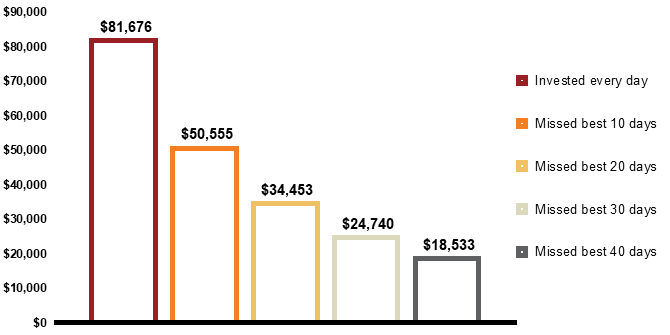Investors facing volatile markets need skill, scale and discipline
Such mistiming can have a significant impact on potential portfolio returns. As the chart below shows, an investor who missed the 10 best market return days during the period analysed (May 1995 to September 2018) would have given up more than a third of the portfolio return they could have earned if they had been invested for the entire 23+year period.

Of course, the reverse is also true. Missing even just one of the period’s 10 worst performing days would have helped boost portfolio returns; that portfolio would be worth nearly double ($150,162 instead of $81,676) that of a portfolio that had been ‘invested all days.’
If we extend the number of ‘missed days’ to 20, 30, even 40, the difference is striking:
- An investor who missed the 40 best days over the last 23+ years was left just 23% of their original portfolio value.
- An investor who missed the 40 worst days enjoyed a portfolio value worth over five times more than the value of a portfolio that was ‘invested all days.
Time those exits and entries correctly and you’d be a rock star!
This pattern of quick reversals between best and worst days has been repeated frequently over the past 23+ years. Correctly timing when to get out of – and back into – the market is tricky. Get out right after a ‘worst’ day, and one might not get back in soon enough to catch a ‘best’ day.
The Bottom Line
Short-term volatility can be nerve-wracking. But, trying to avoid being invested on the bad days and catching only the good days requires making two decisions correctly:
- knowing when to get out of the market, and
- knowing when to get back into the market.
They’re both difficult calls to make. It takes skill, scale and discipline to successfully navigate today’s increasingly complex markets 1. Rather than reacting to volatility and trying to time short-term market gyrations, partner with a professional to develop and implement an investment plan that best achieves your long-term goals.
1https://russellinvestments.com/au/insights/library/investment-strategy-lessons-from-the-chess-grandmasters